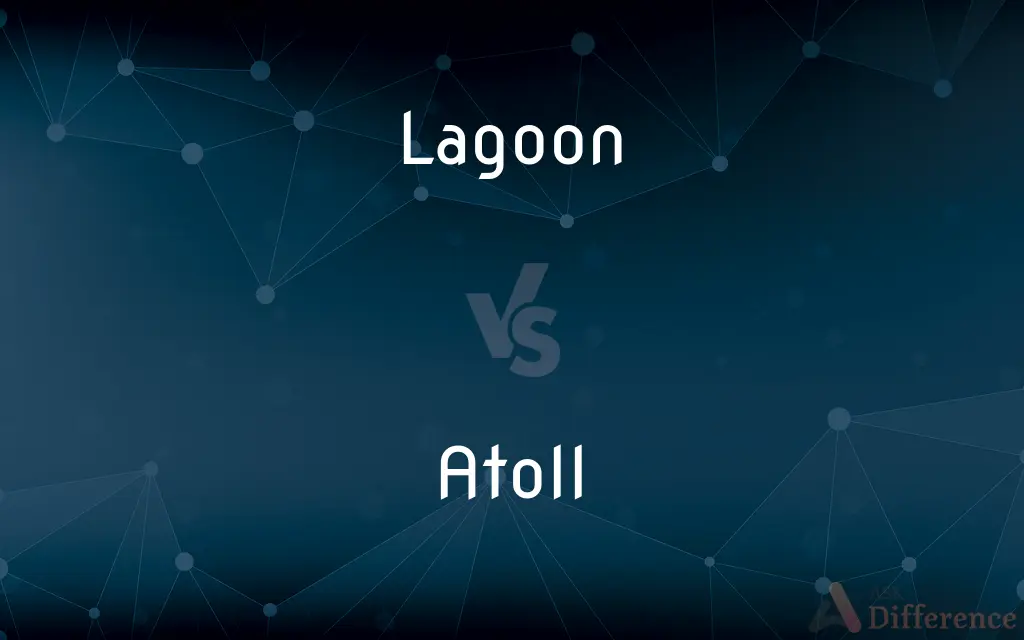Lagoon vs. Atoll — What's the Difference?
By Tayyaba Rehman & Maham Liaqat — Updated on March 27, 2024
A lagoon is a shallow body of water separated from a larger sea by barriers, while an atoll is a ring-shaped coral reef, island, or series of islets encircling a lagoon.

Difference Between Lagoon and Atoll
Table of Contents
ADVERTISEMENT
Key Differences
A lagoon is typically a shallow body of water situated alongside a coastline, separated from the ocean or sea by a physical barrier such as a sandbar, coral reef, or spit. These bodies of water can be saltwater, brackish, or freshwater, depending on their connectivity to the open sea and the sources of fresh water feeding into them. On the other hand, an atoll is a specific type of coral reef ecosystem that forms a ring, surrounding a central lagoon. Atolls are usually found in warm, tropical ocean waters and are characterized by a rich diversity of marine life.
The formation of a lagoon is often the result of the sea rising behind a barrier beach, whereas atolls typically form from the subsidence of volcanic islands, leaving a coral reef encircling the lagoon that remains. This fundamental difference in formation reflects the unique geological processes behind each feature.
Lagoons serve as important habitats for a wide variety of wildlife, acting as nurseries for fish, birds, and other species. They are also vital for coastal protection, absorbing storm surges and buffering coastlines against erosion. Atolls, while also rich in biodiversity, are especially known for their coral ecosystems, which support a multitude of marine species, including fish, birds, and marine mammals. The central lagoon of an atoll often harbors unique species adapted to its protected, tranquil waters.
While both lagoons and atolls play significant roles in their respective ecosystems, their cultural and economic impacts differ. Lagoons can be integral to the economies of coastal communities through fisheries, aquaculture, and tourism. Atolls, with their stunning beauty and biodiversity, are often hotspots for tourism, particularly for diving and snorkeling enthusiasts drawn to their vibrant coral reefs and clear waters.
Despite their differences, both lagoons and atolls are facing threats from climate change, including rising sea levels, increased storm frequency and intensity, and coral bleaching. Their conservation is crucial for preserving biodiversity and supporting the livelihoods of local communities.
ADVERTISEMENT
Comparison Chart
Definition
A shallow body of water separated from the sea by a barrier.
A ring-shaped coral reef enclosing a lagoon.
Formation
Formed by barriers like sandbars or coral reefs.
Formed from the subsidence of volcanic islands, leaving a coral ring.
Water Type
Can be saltwater, brackish, or freshwater.
Saltwater, with conditions influenced by the ocean.
Biodiversity
Supports a variety of fish, birds, and plant species.
Rich in marine life, especially coral species and reef fish.
Economic Impact
Fisheries, aquaculture, tourism.
Tourism, particularly diving and snorkeling.
Compare with Definitions
Lagoon
A shallow body of water separated from larger water bodies by a natural barrier.
The coastal village was nestled beside a tranquil lagoon.
Atoll
Formed from coral growth around sinking volcanic islands.
Over millennia, the atoll emerged as the volcano receded into the ocean.
Lagoon
Can have varying salinity levels.
The lagoon's brackish water is ideal for certain types of aquatic plants.
Atoll
A destination for marine tourism.
Tourists visit the atoll to experience its untouched beauty and vibrant coral reefs.
Lagoon
Serves as a crucial habitat for wildlife.
Birds flock to the lagoon, drawn by its abundant fish.
Atoll
A ring-shaped coral reef, island, or series of islets surrounding a lagoon.
The atoll's crystal-clear lagoon was a diver's paradise.
Lagoon
A site for recreation and tourism.
Families enjoyed picnics by the serene lagoon.
Atoll
Hosts diverse marine ecosystems.
The atoll's lagoon is home to numerous species of fish and coral.
Lagoon
Important for coastal protection.
The lagoon acts as a natural buffer against storm surges.
Atoll
Vulnerable to climate change effects.
Rising sea levels pose a significant threat to the atoll's existence.
Lagoon
A lagoon is a shallow body of water separated from a larger body of water by a narrow landform, such as reefs, barrier islands, barrier peninsulas, or isthmuses. Lagoons are commonly divided into coastal lagoons and atoll lagoons.
Atoll
An atoll ( ), sometimes known as a coral atoll, is a ring-shaped coral reef, including a coral rim that encircles a lagoon partially or completely. There may be coral islands or cays on the rim.
Lagoon
A shallow body of water, especially one separated from a sea by sandbars or coral reefs.
Atoll
A ring-shaped reef, island, or chain of islands formed of coral.
Lagoon
A shallow artificial pond used for treating or storing liquid waste material or for collecting flood waters.
Atoll
An island or chain of islets connected by a coral reef that nearly or entirely encloses a lagoon.
Lagoon
A shallow body of water separated from deeper sea by a bar.
Atoll
A type of island consisting of a ribbon reef that nearly or entirely surrounds a lagoon and supports, in most cases, one to many islets on the reef platform. Atolls have a unique geology, so not all islands with a reef and a lagoon are atolls.
Lagoon
A shallow sound, channel, pond, or lake, especially one into which the sea flows; as, the lagoons of Venice.
Atoll
A coral island or islands, consisting of a belt of coral reef, partly submerged, surrounding a central lagoon or depression; a lagoon island.
Lagoon
A lake in a coral island, often occupying a large portion of its area, and usually communicating with the sea. See Atoll.
Atoll
An island consisting of a circular coral reef surrounding a lagoon
Lagoon
A body of water cut off from a larger body by a reef of sand or coral
Common Curiosities
Why are lagoons important?
Lagoons are crucial for biodiversity, serving as habitats for various species, and they protect coastlines from erosion and storm surges.
Can lagoons be found in freshwater environments?
Yes, lagoons can be freshwater, brackish, or saltwater, depending on their connections to the sea and fresh water sources.
What is the main difference between a lagoon and an atoll?
A lagoon is a shallow body of water separated from larger seas by barriers, whereas an atoll is a ring-shaped coral formation encircling a lagoon.
How do atolls form?
Atolls form from the coral growth around subsiding volcanic islands, eventually creating a ring-shaped reef around a central lagoon.
Are atolls only found in tropical regions?
Yes, atolls typically form in warm, tropical ocean waters where coral growth is optimal.
How do lagoons and atolls support human activities?
Both are vital for tourism and can support fisheries and aquaculture, but atolls are particularly renowned for diving and snorkeling.
What threats do lagoons and atolls face?
They are threatened by climate change, including rising sea levels, coral bleaching, and increased storm intensity.
Are there efforts to protect lagoons and atolls?
Yes, conservation efforts include protecting coral reefs, regulating tourism, and initiatives to mitigate the effects of climate change.
Can a lagoon exist without being part of an atoll?
Yes, lagoons can exist independently of atolls, as they can form along any coastal area with the right conditions.
What makes atolls unique in terms of biodiversity?
Atolls offer a unique, isolated habitat that supports a diverse range of coral species and marine life adapted to lagoon environments.
Share Your Discovery

Previous Comparison
Stun vs. Stagger
Next Comparison
Inlaw vs. OutlawAuthor Spotlight
Written by
Tayyaba RehmanTayyaba Rehman is a distinguished writer, currently serving as a primary contributor to askdifference.com. As a researcher in semantics and etymology, Tayyaba's passion for the complexity of languages and their distinctions has found a perfect home on the platform. Tayyaba delves into the intricacies of language, distinguishing between commonly confused words and phrases, thereby providing clarity for readers worldwide.
Co-written by
Maham Liaqat














































